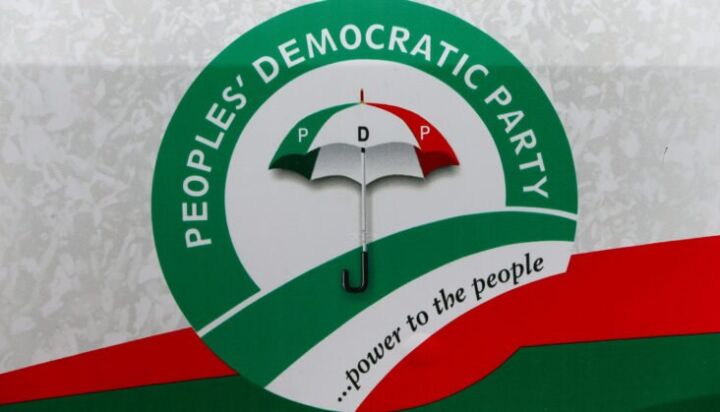In anticipation of the Edo State governorship election scheduled for 21 September 2024, seventeen out of the eighteen participating political parties have committed to a peace accord, aimed at ensuring a peaceful and credible electoral process.
However, the event was marked by controversy as the Edo State Peoples Democratic Party (PDP), led by its Chairman Anthony Aziegbemi and its candidate Asue Ighodalo, refused to sign the agreement.
This decision stems from the arrest and detention of ten PDP members by the police in Abuja, a move the party views as unjust and politically motivated.

Speaking to the media, Aziegbemi stated, “We are here to register our protest before the peace committee and to say that the PDP will not sign the peace accord when 10 of our members have been arrested and detained by the police in Abuja.
“The refusal to sign has sparked concerns about potential tension ahead of the election, with the PDP insisting on justice for its detained members before committing to any peace agreement.
The Inspector-General of Police, Kayode Egbetokun, who was present at the peace accord signing, addressed the situation by clarifying that he was unaware of any specific arrests targeting PDP members.
“However, I am aware that individuals who committed crimes and political violence in the state have been arrested,” Egbetokun said.
This statement highlighted the ongoing challenges of distinguishing politically motivated detentions from lawful enforcement actions in the volatile pre-election environment.
Bishop Matthew Hassan Kukah, the Convener of the National Peace Committee, emphasised the importance of peace as a fundamental prerequisite for a credible election.
He urged all candidates and their supporters to commit to non-violence, stating, “The task before us is to support the Independent National Electoral Commission (INEC) in ensuring a peaceful election devoid of violence.
Kukah underscored that Nigeria should consider itself fortunate compared to other African nations plagued by political crises and unrest.
He expressed hope that the confidence of Nigerians in the electoral process would continue to strengthen, reminding everyone that even flawed elections could be corrected through future democratic processes.
In his welcome address, General Abdulsalami Abubakar, Chairman of the National Peace Committee, reiterated the committee’s long-standing commitment to promoting peace, unity, and democratic values in Nigeria.
Since its establishment in 2014, the committee has worked to create an environment where every Nigerian can exercise their constitutional right to vote without fear of violence or intimidation.
“Peace is the foundation upon which progress and development are built,” Abubakar stated, urging all political actors to uphold their commitment to peace not just during the elections but also in the aftermath, regardless of the results.
Prof. Mahmood Yakubu, Chairman of INEC, reassured stakeholders that the electoral body would continue to operate in accordance with Nigeria’s electoral laws.
He expressed gratitude to the National Peace Committee for its efforts in uniting political parties and their candidates in support of a peaceful electoral process.
“INEC remains dedicated to conducting a free, fair, and credible election,” Yakubu affirmed, highlighting the commission’s readiness to manage the electoral process impartially.
The Inspector-General of Police further pledged the commitment of the police and other security agencies to maintaining neutrality and professionalism during the elections.
“We will remain impartial, professional, and vigilant while providing a level playing ground for all political parties and their candidates,” Egbetokun assured.
This statement aims to build public trust in the security apparatus and its role in safeguarding the integrity of the election.
In a surprising turn of events, the All Progressives Congress (APC), which had initially declared its intention to boycott the peace accord, ultimately reversed its decision and signed the agreement.
This move was welcomed by many observers who see it as a positive step towards ensuring that all major parties are on board with the commitment to a peaceful electoral process.
As the election date approaches, the peace accord serves as a symbolic yet crucial step towards mitigating potential violence and ensuring that the will of the people prevails.
The National Peace Committee’s efforts to bring parties together underscore the importance of collaboration and dialogue in the pursuit of democratic stability.
However, the refusal of the PDP to sign the peace accord highlights underlying tensions that must be addressed to foster a truly inclusive and peaceful electoral environment in Edo State.
The forthcoming governorship election is a critical test for Nigeria’s democratic institutions and the commitment of its political actors to peaceful and credible elections.
The involvement of all stakeholders, from security agencies to civil society, will be essential in ensuring that the electoral process is not only fair but also free from the violence that has marred past elections in the region.
As Edo State moves closer to election day, the eyes of the nation will be on its political leaders to uphold their commitments to peace and democracy.
Support InfoStride News' Credible Journalism: Only credible journalism can guarantee a fair, accountable and transparent society, including democracy and government. It involves a lot of efforts and money. We need your support. Click here to Donate
